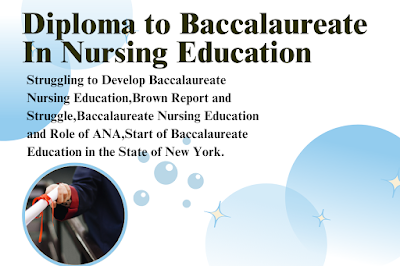Nursing Struggle Milestones for Baccalaureate Nursing Education

Struggling to Develop Baccalaureate Nursing Education,Brown Report and Struggle,Baccalaureate Nursing Education and Role of ANA,Start of Baccalaureate Education in the State of New York.
Struggling to Develop Baccalaureate Nursing Education
Many schools followed the University of Minnesota's lead to offer students courses that supplemented diploma education. The most progressive of these programs was started at Teachers College, Columbia University, in 1917. Here students received 2 years of science at the university, 2 years of nursing at Presbyterian Hospital in New York, and 1 year of specialization in either public health or education (Bullough & Bullough, 1978).
By the 1930s the number
of students completing this “collegiate curricula” doubled, but these emerging
baccalaureate programs remained chaotic and often resembled today's graduate
education with an emphasis on specialization in public health, teaching,
administration, and clinical specialties (Stewart, 1943, p. 276).
Brown Report and Struggle
In the 1940s the development of baccalaureate nursing education continued, but the struggle to define it, develop curricula for it, and understand nursing roles from within it remained problematic. The Brown Report was especially helpful in making bold statements about baccalaureate nursing education. Brown (1948) wrote that nursing education belonged in institutions of higher education and that curricula in higher education for nursing education be integrated (including liberal and technical training for professional practice).
She also wrote that the degree granted from integrated curriculum should be the Bachelor of Science in Nursing and that these nurses be prepared for complex clinical situations requiring high levels of education and skill. By the 1960s baccalaureate education was taking shape. In particular, preparation in liberal education, intellectual skills, and content in leadership, management, community health, and teaching differentiated it from diploma or associate degree education (Kelly & Joel, 2002).
Baccalaureate Nursing Education and Role of ANA
The struggle for baccalaureate education seemed to be resolving, and the American Nurses Association position paper (1965) calling for the baccalaureate to be the entry-level degree for nursing certainly strengthened the argument for baccalaureate education. Nonetheless, other groups, including the Surgeon General's Consultant Group's document Toward Quality in Nursing (US Public Health Service, 1963) and the National Commission for the Study of Nursing and Nursing Education (1970) were cautious in firmly stating that all licensed nurses needed baccalaureate preparation.
These groups advocated for additional research to understand the skills and responsibilities required for high quality patient care.But this specific research (described in the next section) would not occur until nearly 40 years later. Understanding Baccalaureate Nursing Education Today Since the 1960s, baccalaureate nursing education programs have doubled. Today there are approximately 674 baccalaureate programs (Amos, 2005).
Although there was a decline in enrollments in these programs during the 1990s, since 2001 enrollments have increased, with an 18 percent increase in baccalaureate prepared nursing graduates (AACN, 2006b). Until recently, little research existed that responded to calls put forth in the 1960s to understand the relationship between educational preparation and quality patient care.
As previously described,
studies showed registered nurses, regardless of academic preparation, perform
similarly in practice. A series of recent studies is changing this
understanding because each of these studies has shown that hospitals with more
baccalaureate prepared nurses have lower patient mortality rates (Aiken,
Clarke, Cheung, Sloane, & Silber, 2003; Estabrooks, Midodzi, Cummings,
Ricker , & Giovannetti, 2005; Tourangeau, 2007).
As evidence mounts showing the relationship
between higher education for nurses and improved patient outcomes, one could
expect the momentum for the baccalaureate degree as the degree needed for
entry-level practice as a registered nurse to increase. See Contemporary
Practice Highlight 2-1 for an example of one state's proposal to address
baccalaureate registered nurse preparation. What matters here is that support
for baccalaureate nursing education does not mean opposing practical,
associate, or diploma nursing education.
Rather, it means striving to encourage
nursing peers without baccalaureate degrees to pursue this degree, becoming
active in making baccalaureate education accessible and affordable, and working
as a team regardless of the academic preparation of a nurse.
Start of Baccalaureate Education in the State of New York
In 2007 the New York State Nurses
Association introduced a bill (A2480/S294) that would require registered
professional nurses to attain a baccalaureate degree in nursing within 10 years
of their initial licensure. The bill is modeled after an existing requirement
in the state of New York that requires public school teachers to obtain a
master's degree within 5 years of their initial teaching certification. If this
bill to advance nursing education within the state of New York succeeds and
becomes a law, it may mean that other states follow suit, thus increasing the
number of baccalaureate-prepared nurses nationwide.
A coalition entitled Coalition for
Advancement of Nursing Education (CANE) has been formed to generate support
within the state of New York for this bill
(http://www.rneducationadvanceny.org). As of February 2008, bill A2480/S294 had
been referred to the higher education committees of the New York State Assembly
and State Senate. The status of this bill can be tracked on the New York State
Nurses Association website (Retrieved 4/10/08 from
http://www.nysna.org/advocacy/acti).




Give your opinion if have any.